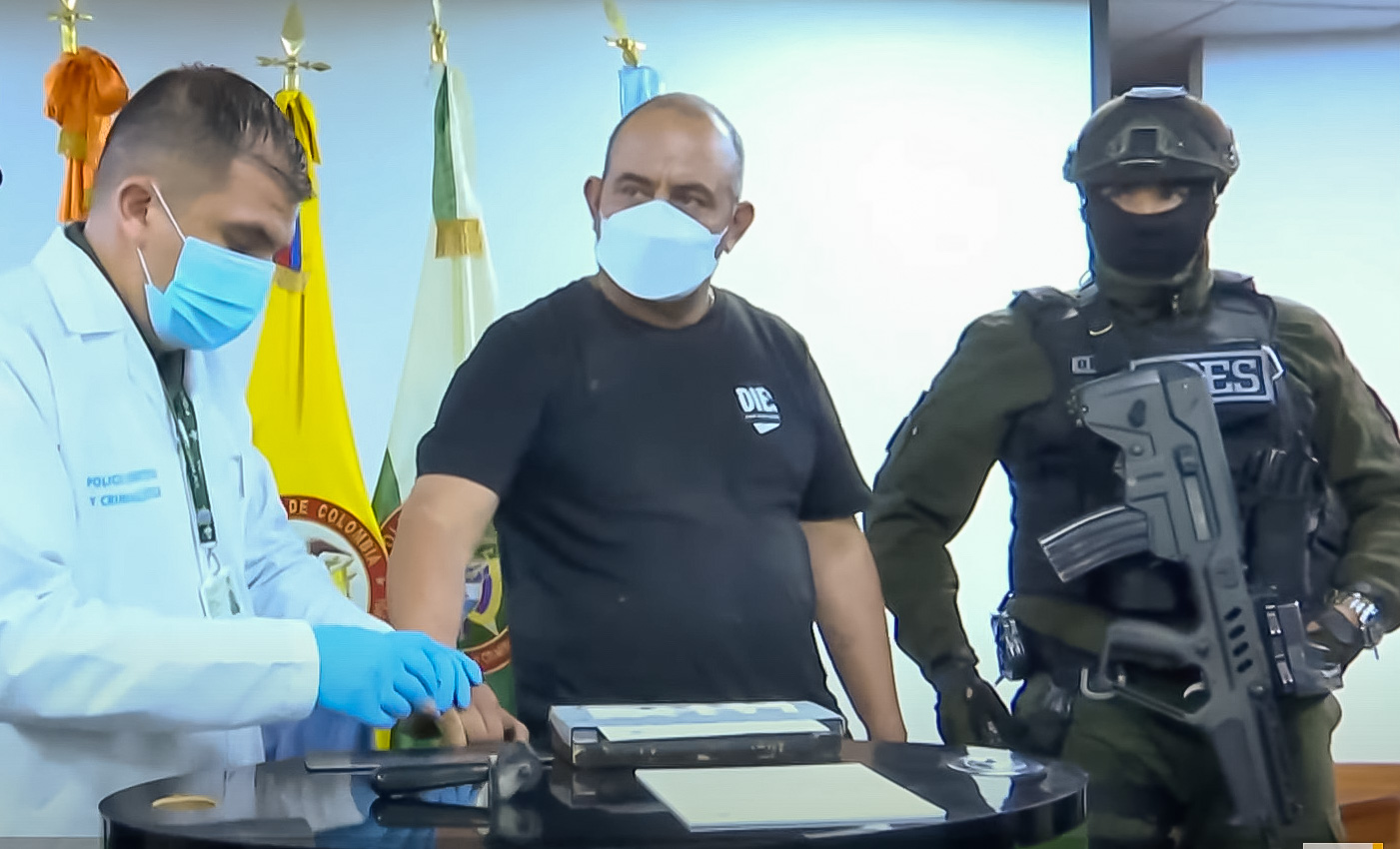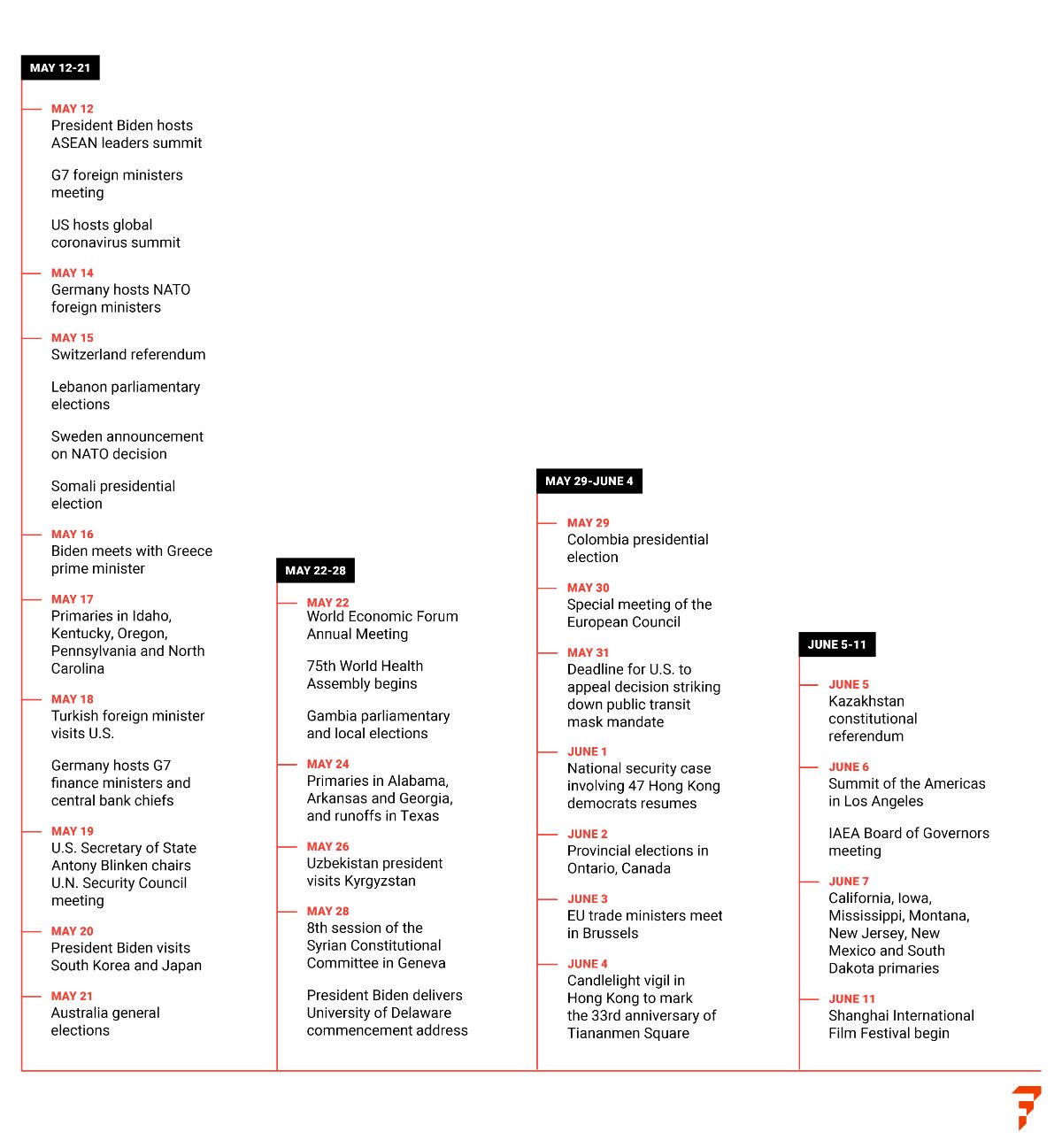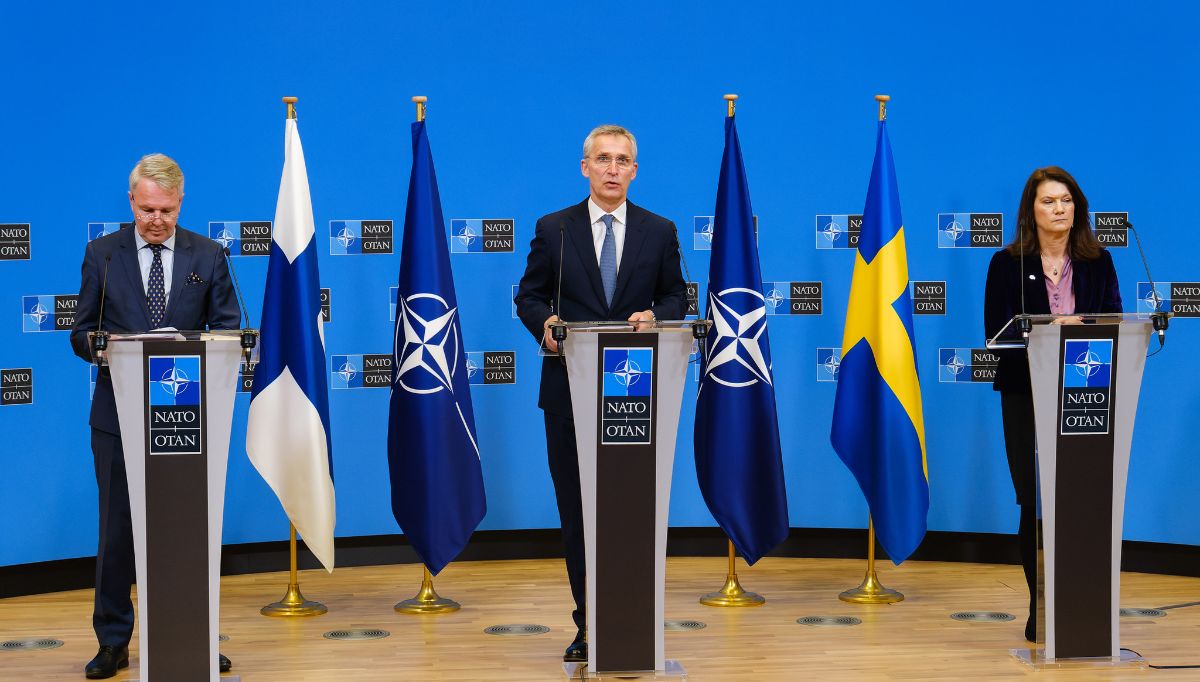Welcome to Factal Forecast, a look at the week’s biggest stories from the editors at Factal. We publish our forward-looking note each Thursday to help you get a jump-start on the week ahead. If you like what you see, you can subscribe for free to get the Forecast in your inbox.
The Factal Forecast team is taking a break next week, but we’ll return to updating you on the week ahead on May 26. In the meantime, be sure to follow us on Twitter where we’ll still be posting breaking news.
While Colombia recovers from a deadly four-day “armed strike” by the Clan del Golfo cartel, the country’s leadership is ramping up security forces. In this week’s Factal Forecast podcast, Senior Editor Jimmy Lovaas and Editor Irene Villora discuss the incident that sparked the recent violence and how efforts to crack down on the cartel could prompt further unrest.
Listen now or download on your favorite platform.
Week of May 12-20
A Look Ahead
May 12
Biden hosts ASEAN Summit
The United States will host a special summit with ASEAN leaders for two days beginning Thursday in Washington, D.C.
What’s happened so far
The summit was initially set for March but was postponed due to scheduling issues among ASEAN leaders. Just two leaders will be absent, with Philippine President Rodrigo Duterte set to leave office shortly and Myanmar’s coup leader barred from attendance.
The impact
Likely topics of discussion include trade, China, Myanmar and the war in Ukraine, for which ASEAN nations have largely refused to condemn Russia. As for Myanmar, the summit offers a chance to refocus efforts on curbing continued atrocities committed by the military junta and putting the country back on the path toward democratization. On the trade front, U.S. President Joe Biden will likely continue to push his Indo-Pacific Economic Framework, which follows years of U.S. retreat from regional trade.
May 15
Lebanon parliamentary elections
Lebanese voters will head to the polls Sunday for parliamentary elections amid widespread economic and political turmoil in the country. Turnout is expected to be large, with about 60 percent of overseas citizens having cast ballots already.
What’s happened so far
Lebanon’s Iran-backed Shiite Hezbollah party and its allies currently hold a majority at the 128-seat parliament. Since the 2018 elections, the country has faced one of its worst economic crises with the local currency losing approximately 90 percent of its value since 2019. Nearly 245,000 expatriates registered to vote abroad between May 6 and 8 — more than twice the figure registered in 2018.
The impact
Dozens of new candidates have entered the political scene in Lebanon in this round of parliamentary elections, many of whom are known as “thawra” or revolution candidates who rose to prominence during the youth-led movement in October 2018. These movements, however, have failed to unify and, as a result, analysts predict the composition of the new parliament will remain unchanged. Whichever movement wins the 65-seat majority will have to execute key structural changes set as conditions for the International Monetary Fund to provide Lebanon with $3 billion in financing.
May 15
Somali presidential election
Somalia’s parliament will finally select a president from nearly 40 candidates, including incumbent President Mohamed Abdullahi Mohamed, on Sunday, following more than a year of delays marked by political deadlock and violence.
What’s happened so far
Somalia has faced a national leadership crisis since April 2021, when President Mohamed Abdullahi Mohamed controversially extended his presidential mandate, triggering a feud with Prime Minister Mohammed Hussein Roble. After multiple missed deadlines, Somalia’s parliamentary elections were finally completed last month, paving the way for this weekend’s presidential elections. Al-Shabab continues to stage attacks in Somalia with deadly regularity, most recently targeting politicians and African Union forces.
The impact
The elections will take place in a heavily-guarded and fortified airport hangar in Mogadishu where Somalia’s parliamentary proceedings are sometimes held. Somalia is under pressure to establish a new government by May 17, or risk losing budget support from the International Monetary Fund, though the country has asked for a three-month extension. With important political figures gathering for the elections, al-Shabab may attempt to find another opportunity to disrupt the proceedings.
May 15
Swiss referendums
On Sunday, Switzerland will hold three referendums on a range of issues, including the direct funding of Swiss films, EU integration and organ transplants.
What’s happened so far
Switzerland will hold four rounds of referendums this year — the first round took place in February, and two more will take place in September and November. Swiss citizens will vote this month on the so-called “Lex Netflix” referendum, which asks streaming services like Netflix to pay at least 4 percent of their income in the country toward local film production. They will also vote on objection-based organ donation rules.
The impact
The most crucial vote will decide whether to increase the budget and staffing of the controversial European Border and Coast Guard Agency known as Frontex. Switzerland’s minister of police and justice warned the nation could be forced to leave the Schengen zone if people vote against its expansion. Vote organizers also suggested they want the agency disbanded and free movement for all migrants to Europe.
May 15
Sweden announcement on NATO decision
Sweden’s ruling Social Democrats will announce Sunday whether they have decided to end decades-long opposition to joining NATO, paving the way for the country to join the military alliance.
What’s happened so far
For much of its modern history, Sweden has rejected military alliances, preferring to act as a neutral third party concerned with ending conflicts through dialogue. Through the Cold War it dealt with the Soviet threat with spending aimed at defending itself. Russia’s invasion of Ukraine shifted public opinion and Sweden quickly pledged to provide defensive aid to the country, and now public support favors joining NATO.
The impact
It’s possible an application to join NATO would be made shortly after the decision, potentially coming as a package deal with fellow EU member Finland, which has also historically remained outside the alliance. Both countries with their advanced, well-equipped militaries and a history of cooperation with NATO would likely be fast-tracked through the process. Russia has warned both countries of consequences if this were to happen.
May 18
Turkish foreign minister visits U.S.
Turkey’s Foreign Minister Mevlüt Çavuşoğlu will visit the United States on Thursday for the first bilateral talks in three years.
What’s happened so far
Çavuşoğlu will fly to Washington to meet his U.S. counterpart, Secretary of State Antony Blinken, to discuss the purchase of 40 F-16 jets in the frame of the Strategic Mechanism, which sets trade and cooperation goals between the counties. The parties will also discuss Turkey’s relations with Russia amid the conflict in Ukraine. The relations between Turkey and the United States have been tense in the past due to issues like Turkey’s purchase of Russian air defense missiles and different stances on the war in Syria.
The impact
This is the first high profile visit of a Turkish official to Washington since the Biden administration took office. Turkey hopes to obtain approval from the U.S. Congress to purchase defense materials after a slight improvement in relations with Western countries due to Turkey’s mediation efforts between Russia and Ukraine since the start of the invasion.
May 20
Biden visits South Korea and Japan
In his first trip to Asia since taking office, President Joe Biden will head to South Korea and Japan for a multi-day visit beginning Friday.
What’s happened so far
The White House says Biden is expected to hold bilateral meetings with his Japanese and South Korean counterparts in each respective country, including newly elected South Korean President Yoon Suk-yeol. Biden will also gather with leaders of the Indo-Pacific alliance known as the Quad, which consists of Australia, Japan, India and the United States. White House Press Secretary Jen Psaki said the leaders are expected to discuss security and economic issues.
The impact
Biden’s trip comes amid ongoing tension with China and North Korea, the latter having conducted 15 weapons tests so far in 2022 in an accelerating pace of missile launches. Observers say Biden’s visit also comes as the administration is seeking to affirm responses by allies in Asia to the continuing Russian invasion of Ukraine.
May 21
Australia elections
People across Australia will decide Saturday if they want three more years of Prime Minister Scott Morrison and his center-right coalition or a change with Anthony Albanese and his center-left party.
What’s happened so far
Last month, Morrison announced a new federal election — it will be the country’s first federal election since Morrison’s surprise win in 2019. Back then, his coalition upended opinion polls following a campaign that focused on cutting immigration and not messing with the economy. This time around, Morrison has been campaigning on his response to the pandemic.
The impact
Voters appear to be favoring the opposition this time at an even larger clip than in 2019. Recent polls show Albanese’s Labor party well ahead of Morrison’s Liberal-National Coalition. Albanese has been campaigning on lowering the cost of living and promoting job growth. A Labor win would lead to a large upheaval in the status quo for Australia’s economy.
What Else Matters

Libya power struggle
Libya, which holds Africa’s biggest oil reserves, is experiencing renewed political instability that risks derailing a 19-month-old ceasefire that halted a civil war between its eastern and western regions. The east, where most of the oil is located, suspended exports to pressure the government based in the west to step down in favor of another it selected in an effort to consolidate power.
Watch for: The truce brokered by the United Nations appears more fragile than at any time since it was signed in October 2020, after the east-based parliament appointed Fathi Bashagha to run a new government. Prime Minister Abdul Hamid Dbeibeh is refusing to give up power, despite the expiration of his mandate in February, on grounds that Bashagha wasn’t elected by popular vote as stipulated in the UN-mediated agreement. The nation now has two governments jockeying for international recognition, prompting renewed international intervention to avert a backslide into what would mark a third civil war since the Arab Spring ouster of leader Muammar Gadhaffi. The U.S. envoy to Libya says UN-sponsored talks are set to resume May 15.
Colombia’s Clan del Golfo armed strike
At least six people were killed in more than 300 acts of violence perpetrated by Colombia’s Clan del Golfo cartel members during an “armed strike” (member’s link) last weekend across 11 municipalities. For four days, civilians were warned to not leave their homes, go to work or open their businesses under threats of violence. The “armed strike” was announced after the cartel’s leader Dairo Antonio Úsuga, also known as “Otoniel,” was extradited to the United States to be prosecuted on drug trafficking charges. Otoniel was captured by Colombian authorities in October 2021 in Antioquia after leading one of the most powerful drug cartels in the country’s history since 2003. After his arrest, Otoniel submitted a list to Colombia’s Special Jurisdiction for Peace with names of politicians and organizations who have been involved with the cartel. During his first court hearing, Otoniel pleaded not guilty to all charges.
Watch for: With his next hearing scheduled for June 2 and a final trial date still to be determined, the drug lord could face 20 years to life in a U.S. maximum security center if found guilty. The extradition has been met with some resistance in Colombia as some of the group’s victims fear Otoniel will not be held accountable for crimes committed back home. The Colombian government announced 16 more members of the organization could be extradited to the United States after the “armed strike” and offered monetary rewards in exchange for any information about the group’s members and operations, which could prompt further unrest. President Iván Duque also announced a significant reinforcement of security forces in areas affected by Clan del Golfo violence and an aggressive approach to combating the group in the final stages of his presidential term. The Duque administration, which has been characterized by a hard offensive line in security matters, has been met by an uptick in violence from drug cartels and guerrillas.
Extended Outlook
What’s on our radar in the coming weeks…

Thanks for reading! To get the Forecast in your inbox, you can sign up for free.
Lead Photo: NATO Secretary General Jens Stoltenberg (center) met with Finland’s Foreign Minister Pekka Haavisto (left) and Sweden’s Foreign Minister Ann Linde (right) at NATO headquarters in Brussels on Jan. 24, 2022. (Photo: NATO / Flickr)
What is Factal?
Trusted by many of the world’s largest companies and nearly 300 humanitarian NGOs, Factal is a risk intelligence and collaboration platform that brings clarity to an increasingly noisy and uncertain world.
Powered by a hybrid of advanced AI and experienced journalists, Factal detects early signals, verifies critical details and assesses the potential impact at the speed of social media. From physical incidents and brand mentions to geopolitical developments, Factal offers the most trusted, real-time risk intelligence on the market.
Factal is also home to the largest security and safety collaboration network in the private sector. Members securely share information with other members in proximity to the same incident, both on Factal.com and the Factal app.
Learn more at Factal.com, and we’d love to hear from you.

